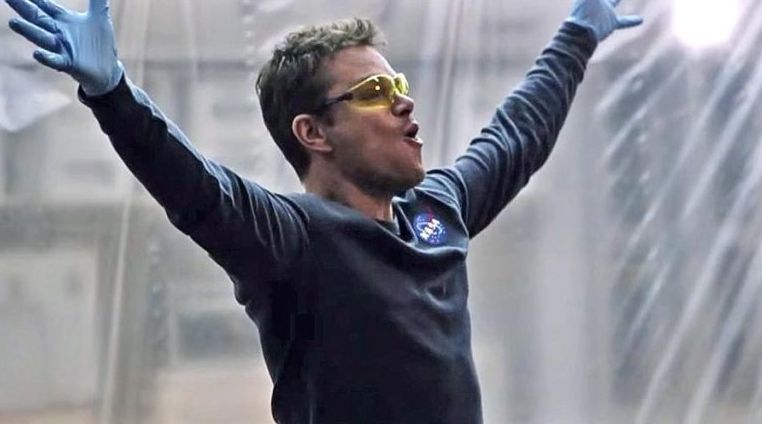
The Martian - An Emotional Powerhouse
 Films like Ridley Scott's The Martian (check out the Official Trailer) are the reason that cameras first rolled over a hundred years ago. They allow us to go to places we could never go and see things that we could never see, while reminding us of our collective humanity and never taking away even the faintest of hope.
Films like Ridley Scott's The Martian (check out the Official Trailer) are the reason that cameras first rolled over a hundred years ago. They allow us to go to places we could never go and see things that we could never see, while reminding us of our collective humanity and never taking away even the faintest of hope.
The Martian doesn't have an overly complex story- Mark Watney (Matt Damon) is left behind on Mars after a storm forces the crew to abandon their mission. The entire runtime is dedicated wholly to Watney figuring out how to survive on Mars while the rest of humanity struggles to find a way to reach him. It doesn't rely on hokey crutches to try to connect to its audience, instead choosing to invest in and inspire them to reach deep within themselves and discover real, true good. The film has no antagonists (save for Mars herself), the film has no ulterior motives. It is deftly acted by a powerhouse cast led by an actor who carries it all while never sharing any screentime with them. It is an overwhelming journey of the human spirit and the will to survive.
Damon's Watney wakes up after the Martian storm to realize that he is alone on the red planet and the understanding that it will be four years before anyone can effect any kind of rescue. Given the status of the supplies left at the mission site, he reasons he can survive roughly half or more of a Martian year, some 300-400 sols (the Martian day, 24 hours and 37 minutes). He realizes that in order to make it through, he's going to have to learn how to grow crops in the barren Martian soil. What follows is some pretty fascinating science, mostly because it is completely true (Andy Weir, the author of the novel of the same name, did extensive scientific research to make it as realistic as possible). Watney seals off the habitat and burns hydrazine to create water, creating a moisture-rich environment and succeeds in growing potatoes.
Meanwhile, the head of NASA, Teddy Sanders (Jeff Daniels), holds a public funeral for Watney before NASA realizes, by analyzing satellite footage of the landing site, that he has survived. What follows can best be described as Argo in space- what Ben Affleck did for the Iranian hostage crisis, Ridley Scott does for rescuing the stranded astronaut. Every second of film that ticks away stokes the fires of tension with it, slowly pulling one to the edge of their seat and fully immersing them in Watney's struggle to survive and mankind's struggle to bring him home. Its ending is as emotionally overwhelming as it is satisfying, as beautiful as it is haunting, a call to the humanity within all of us and a colossal tidal wave of nothing but wonderful, positive, and good. It is the kind of film that warrants fist-pumping, cheering, and applause. It has an epilogue that frankly isn't really all that necessary and doesn't have anything to say beyond what the rest of the runtime achieved, and is its only downfall, but by the time it comes the entire experience feels so rewarding that it doesn't matter.
Ridley Scott finally returns to greatness and explores the fantastic script with nuance and precision. For generous portions of the film, we are alone with Watney on Mars, but he manages to keep it from getting dull or lagging by constantly moving between different points of view (be it Watney's, parts of the habitat, the rover, or Mars itself) and by fully utilizing the depth of field to create some breathtaking shots of the would-be red planet (filmed in Jordan). He shot the film with 3D cameras and truly utilizes the technology to its fullest extent in a way not often seen since James Cameron did it with Avatar. The camera sweeps over the terrain as objects pass in the foreground, while the expansive red desert stretches out all around in the background. Dust storms and debris vividly encompass the entire field of view, further immersing and investing the audience in the world. Dariusz Wolski's breathtaking cinematography always captures a picturesque vantage point and paints a truly beautiful picture, much as it did in his last collaboration with Scott in Prometheus. It is not too dark and doesn't rely on screen-popping "gotcha" effects, and could easily be a textbook case for how to use 3D technology to benefit a film and not just the studio's wallet.
Yet, given the incredible direction, photography, and performances, the true victory of The Martian is its reliance on science and scientific progress. It is decidedly pro-science as well it should be, and hearkens to a time when intellectual pursuits and scientific exploration weren't derided, but celebrated. It reminds us of the benefits of exploration and human curiosity, and begs of us to keep reaching for more. It reminds us of the good inherent in all of us at a time when so much of the world is so focused on the negative. It asks us to come together more often and celebrate our shared humanity. It offers us a mirror with which we can look back at ourselves. It begs that we never, ever give up.
- Nicholas Haskins